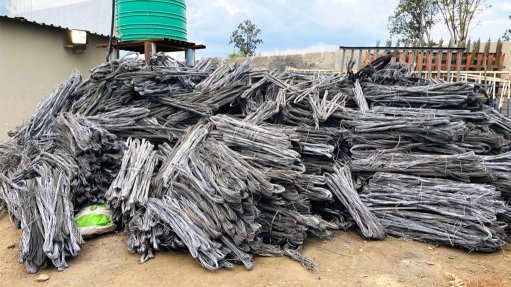History to be more equal than other subjects?
Some associate professor was an in-studio guest on one of our television channels the other night. To mangle a famous quotation from George Orwell’s Nineteen Eighty-Four, he was on about why history should be more equal than other subjects at high school level in South Africa.
He and other dons who comprised a task team put together by Basic Education Minister Angie Motshekga have recommended that history be made a compulsory subject from grade 10 to 12. In its report, the culmination of a three-year study that included scrutinising the way history is taught in countries like Russia, Rwanda and Zimbabwe, the task team avers that “history education at school has the potential to offer explanatory, analytical and interpretive skills”, adding: “Ideally, learners have to be capable of assessing arguments and developing an ability to construct counter- arguments which have to be synthesised within a historical narrative”.
I doubt if anyone would disagree with the task team’s view. But I would have expected the good Minister to move with similar alacrity to fix our mathematics and science education and to improve our learners’ literacy skills, all of which have been shown by countless studies to be some of the weakest links when it comes to improving South Africa’s economic performance.
Not so long ago, the Trends in International Mathematics and Science Study (TIMSS) ranked South African Grade 9 learners thirty- eighth out of 39 countries in mathematics and placed them at the bottom of the pile in science. A most distressing finding of that study was that our grade nines could only manage scores of 372 and 358 for mathematics and physics respectively – way below the TIMSS’s minimum level of competence of 400 points. This underperformance was attributable to, among others, poor discipline, violence and bullying at schools. Shouldn’t we be prioritising tackling these ills?
For its part, the World Economic Forum’s Global Information Technology Report 2016 ranked the overall quality of South Africa’s basic education system 137th out of 139 countries. The quality of mathematics and science education was ranked lower than that of Nigeria, Mozambique and Malawi – all of which are not as resourced as we are.
Illustrating how the poor mathematics and science proficiency of our school leavers is hamstringing efforts to build up a cadre of skilled youngsters, Stellenbosch University logistics management associate professor Jan Huysamen told an interviewer in 2017 that failure by South African universities offering courses in logistics management to get adequate numbers of sufficiently mathematics-savvy students was exacerbating the shortage of logistics experts in the country.
We need more logistics experts, considering that the efficiency of our logistics system has been deteriorating in the past few years, as a result of which our international trade logistics costs – costs associated with moving freight from foreign ports to South African ports and vice versa – equated to 11.8% of trade gross domestic product in 2016. In monetary terms, that’s a whopping R242-billion! We need to slash this figure to a much lower level.
Before Motshekga rushes to implement the make-history-compulsory recommendation, she should consider what former Wits academic Michelle Friedman has said about the plan. For one thing, university education faculties would need to enrol more history undergraduates. But whether money would be available to do this is anybody’s guess, since the education faculties have always been at the bottom of the totem pole, with medicine, engineering, law, et cetera prioritised. Secondly, at least according to Friedman, many students who enrol for history are simply not interested in the subject. My assumption is that the entry barrier is quite low and many of the youngsters would qualify for very few other programmes.
The bottom line of Friedman’s argument, which is based on a study she and her former Wits colleagues conducted last year, is that South Africa is not in a position to produce enough history teachers of the right calibre if the subject was to be made compulsory in grades 10, 11 and 12. But let’s wait and see.
Article Enquiry
Email Article
Save Article
Feedback
To advertise email advertising@creamermedia.co.za or click here
Press Office
Announcements
What's On
Subscribe to improve your user experience...
Option 1 (equivalent of R125 a month):
Receive a weekly copy of Creamer Media's Engineering News & Mining Weekly magazine
(print copy for those in South Africa and e-magazine for those outside of South Africa)
Receive daily email newsletters
Access to full search results
Access archive of magazine back copies
Access to Projects in Progress
Access to ONE Research Report of your choice in PDF format
Option 2 (equivalent of R375 a month):
All benefits from Option 1
PLUS
Access to Creamer Media's Research Channel Africa for ALL Research Reports, in PDF format, on various industrial and mining sectors
including Electricity; Water; Energy Transition; Hydrogen; Roads, Rail and Ports; Coal; Gold; Platinum; Battery Metals; etc.
Already a subscriber?
Forgotten your password?
Receive weekly copy of Creamer Media's Engineering News & Mining Weekly magazine (print copy for those in South Africa and e-magazine for those outside of South Africa)
➕
Recieve daily email newsletters
➕
Access to full search results
➕
Access archive of magazine back copies
➕
Access to Projects in Progress
➕
Access to ONE Research Report of your choice in PDF format
RESEARCH CHANNEL AFRICA
R4500 (equivalent of R375 a month)
SUBSCRIBEAll benefits from Option 1
➕
Access to Creamer Media's Research Channel Africa for ALL Research Reports on various industrial and mining sectors, in PDF format, including on:
Electricity
➕
Water
➕
Energy Transition
➕
Hydrogen
➕
Roads, Rail and Ports
➕
Coal
➕
Gold
➕
Platinum
➕
Battery Metals
➕
etc.
Receive all benefits from Option 1 or Option 2 delivered to numerous people at your company
➕
Multiple User names and Passwords for simultaneous log-ins
➕
Intranet integration access to all in your organisation


















